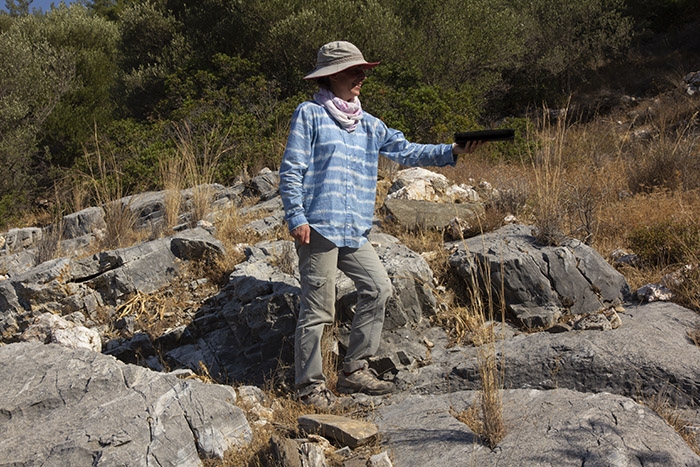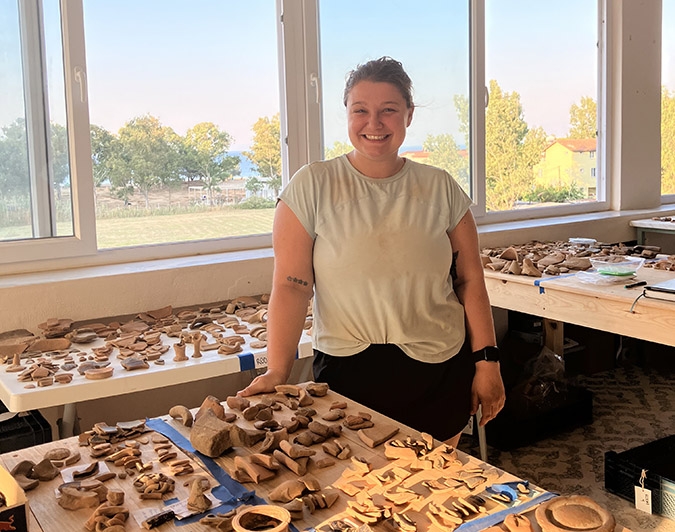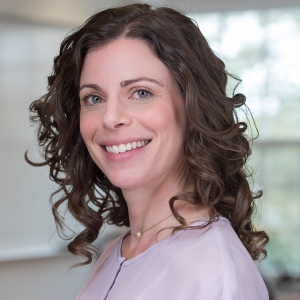For Angela Commito, senior lecturer in classical archaeology, there wasn’t much doubt about where her career path might lead.
A love of working outdoors, a passion for collaboration and a fascination with “stuff” and the past made archaeology a logical choice. She got her first taste of ancient history while in high school and was hooked.
“It sounds so cheesy, but learning about Roman life of 2,000 years ago in high school really opened my eyes to the sense of fulfillment you can get from thinking about your place in time,” said Commito, who came to Union as an adjunct in the Classics department in 2015 and landed a full-time position the following year.
“I’ve known since I was in college that this is what I wanted to do,” she continued. “I love ‘stuff’ and filling out the stories of physical objects.”
Commito’s work has taken her from the Capital Region, where she uses local archaeological finds to provide Union students with a hands-on learning experience, to Notion, Turkey, an area on the Aegean Sea coast in the westernmost part of the country. There, she has spent parts of 10 summers – including this year – as a member of an archaeological team unearthing the stories of an ancient Greco-Roman city.
Commito joined the project team through her doctoral advisor at the University of Michigan and was drawn to the site in large part because of her interest in ancient urbanism and “domestic archaeology,” a less-common aspect of the field that focuses on piecing together the history of ancient sites through remnants of household items and systems.
At the Notion site, the most recent work has centered around unearthing the remains of individual homes and studying the surrounding landscape for clues to life in the region more than 2,000 years ago. In particular, Commito’s work at Notion largely has involved examining pottery found on the site and investigating the water system believed to have been used by the community’s residents.
The site, a border area between ancient Greek civilization to the west and Anatolian settlements to the east, has been designated a formal archaeological site by the Turkish government. So, aside from a local shepherd whose herd grazes in the area and residents who are allowed to pick the oregano that grows wild, the site itself is largely undisturbed.
Commito says that the team’s work at Notion already has refined our understanding of the timeline of the ancient city and has the potential to add to the historical record of an important region.
“The region was enormously vibrant in antiquity as a border land between Greek and Anatolian cultures,” said Commito, who also noted that developing lesser-known sites such as Notion offer particular potential.
“Sites that are the best published become the evidence for how we understand the past,” she said. “Opening up a new window in a new place (such as Notion) helps fill in gaps in our evidence.”
The Union connection
On a personal level, Commito’s work in Notion has offered a chance to stay connected with a former student, Caroline Everts ’19, who also is a member of the Notion team as part of her doctoral work at the University of Michigan. Everts spent her time at Notion this summer examining pottery found at the site.
“We had a great season,” Everts said, adding that the project aligns well with her interest in the region and that the focus on domestic archaeology is valuable because it provides a more holistic view of ancient civilizations by shining a light on “daily life.”
Everts credits Commito with being an “incredible mentor” who exemplifies her time at Union. “It’s so nice to have someone (on the faculty) who cares about you as a human being,” Everts said, who added that her time at Union provided a “very rounded” experience.
“Union gave me the ability to approach pretty much any situation and not feel out of my depth,” Everts said. “I always felt completely supported by Angela and my other professors, which gave me the confidence to put myself out there.”
The value of intersectionality
For her part, Commito is proud of the work being done by her former student and the fact that Everts has chosen to pursue a career in archaeology and academia. At the same time, she is well aware that Everts is the exception when it comes to the students she teaches.
And that’s OK.
“Some people think if you get a degree in Classics, you have to be a Classics professor,” Commito said. “But that’s not true at all. Most of our majors go on to do something that is not at all in the Classics, but their studies have provided this really important foundation.”
At Union, Commito uses her coursework and research interests to connect with students across disciplines and interests.
Among her goals as an educator are to encourage reflection on what the past has to teach us about the present and to develop in her students the critical thinking skills that will serve them well no matter what field they ultimately enter. As examples, Commito points to the visual nature of much of her teaching and the emphasis on examining multiple types of evidence before reaching a conclusion.
“Different types of evidence all tell versions of a story,” Commito said. “How we piece them together to build a case for history is important. There’s always more to (the story). You have to be OK sometimes knowing there are things you don’t know.”
Strength lies in Union
Nearly a decade into her Union experience, Commito is quick to respond to the question: Why Union?
“It’s the people,” she said. “I’ve made incredible connections with people across many fields and with many of my students. I learn so much from (my students) that helps me think much more clearly about what I can do in the classroom that’s actually going to have an impact on them.”
As a Classics scholar and researcher at a liberal arts institution, Commito is all too aware of the need to make the case for relevance to prospective students, and perhaps even more so, to their parents.
It’s a regular topic of conversation among her peers, and Commito insists she has no magic solution. She then proceeds to offer a compelling pitch for the strength that lies within a place such as Union.
“You can get a great education at a lot of places, but if you haven’t made meaningful connections, then that education won’t really transform you in ways that are truly meaningful.
“You want to know the future and you can’t,” she reflected. “It’s those twists and turns that make you strong and make you a more interesting person. You have to be able to imagine other possibilities. Going to Union provides the community and experiences that make the education stick.”


